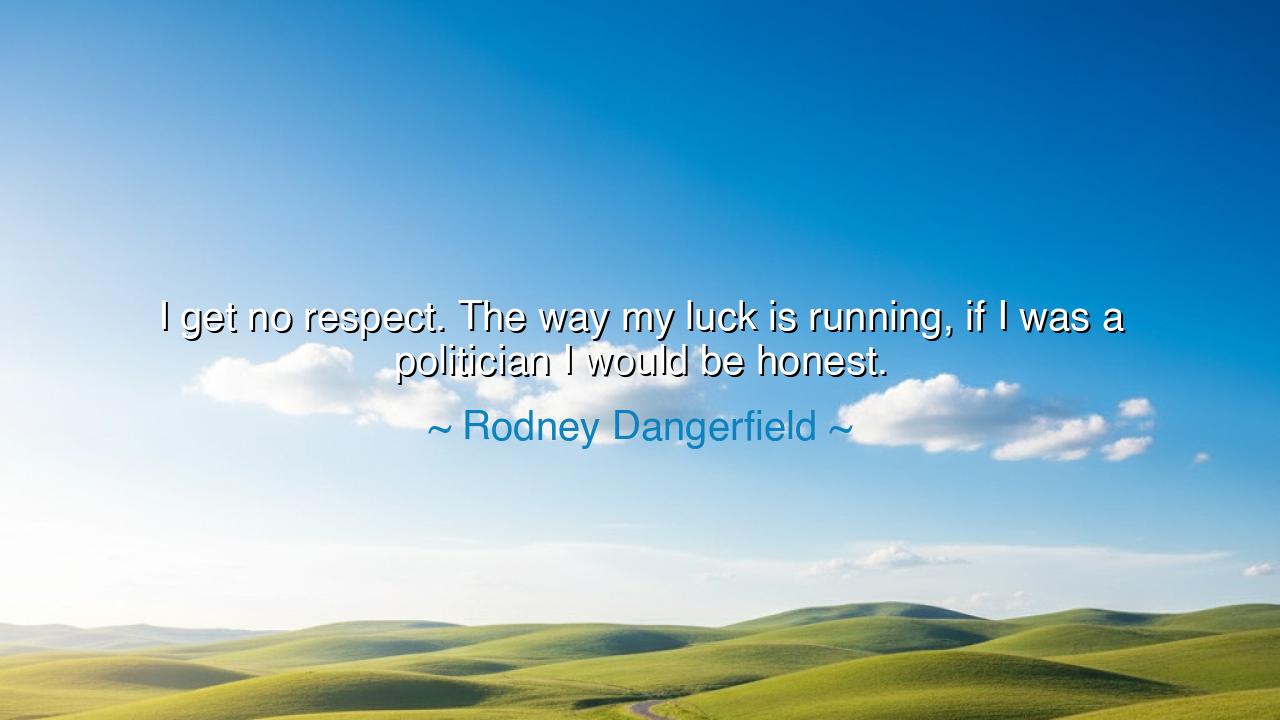
I get no respect. The way my luck is running, if I was a






The jester of our age, Rodney Dangerfield, spoke words wrapped in laughter, yet forged from the iron of human truth: “I get no respect. The way my luck is running, if I was a politician I would be honest.” Do not dismiss these words as mere comedy, for beneath the cloak of jest lies the lament of every soul who has felt unseen, unheard, and cast aside by the world. The comedian, like the prophets of old, uses irony to reveal the hidden fractures of society. His complaint of no respect is the echo of humanity’s deepest hunger—to be recognized with dignity, to be valued not for wealth or power, but for one’s very being.
In this utterance, Dangerfield wields humor as a sword of wisdom. To say that if he were a politician he would be honest is not merely jest, but a piercing commentary on the state of public trust. For what greater irony exists than a world where honesty is so rare in leadership that it seems like bad luck rather than noble virtue? The ancients too knew this truth: when Plato spoke of philosopher-kings, he warned that power without virtue corrupts, and that respect cannot be commanded by office, but only by integrity. Thus, Dangerfield’s lament is not his alone—it is a mirror reflecting the cynicism of an age.
Consider the story of Diogenes of Sinope, the wandering philosopher of Greece. With a lantern, he searched by daylight for an honest man, and found none. Though his words were sharp with mockery, his intent was as profound as Dangerfield’s jest: to awaken society to its own failings. Just as Diogenes exposed the hollowness of his time, so does Dangerfield, through his self-deprecating humor, reveal a modern truth—that respect has become a scarce currency, traded too often for wealth and status, and withheld from those who need it most.
But let us not despair, O children of tomorrow, for hidden within this lament is a call to action. To say “I get no respect” is to voice the cry of millions who walk through life unnoticed, who labor without praise, who love without acknowledgment. Yet from such pain can arise a fire that teaches us compassion. If we feel the sting of disrespect, we know the value of giving respect to others. If we suffer the emptiness of being unseen, we are reminded to open our eyes and see others with fullness.
The hero’s journey is not always bathed in glory. Many who carried truth into the world were met not with honor, but with scorn. Socrates was condemned for his wisdom. Galileo was shunned for his vision of the stars. Yet history, though slow, grants them the respect denied by their peers. So too may those who feel unseen take comfort: respect delayed is not respect lost. What is essential is to walk the path of honesty, even when the world looks away.
Therefore, let Dangerfield’s jest be remembered not as bitterness, but as counsel: do not measure your worth by the applause of the crowd, nor by the fleeting nods of strangers. Instead, measure it by the integrity of your deeds and the honesty of your heart. For though the world may withhold respect, the soul that is steadfast gains a crown no ridicule can tarnish.
The lesson is clear: respect must first be given before it can be received. In daily life, honor those around you with kindness, listen when others speak, recognize the efforts of the unseen and the uncelebrated. Do not scoff at honesty as weakness, but prize it as the foundation of trust. In this way, each man and woman may turn the laughter of despair into the laughter of joy, and transform the jest of a comedian into the wisdom of the ages.
Thus, take these words into your heart. Even when the world offers you no respect, continue to walk the path of honesty. For respect earned through virtue, though slow in coming, will outlast the shallow praise of the crowd, and in the end, will make your life a lantern—shining like Diogenes’, not in search of honesty, but as proof that it still exists.






AAdministratorAdministrator
Welcome, honored guests. Please leave a comment, we will respond soon